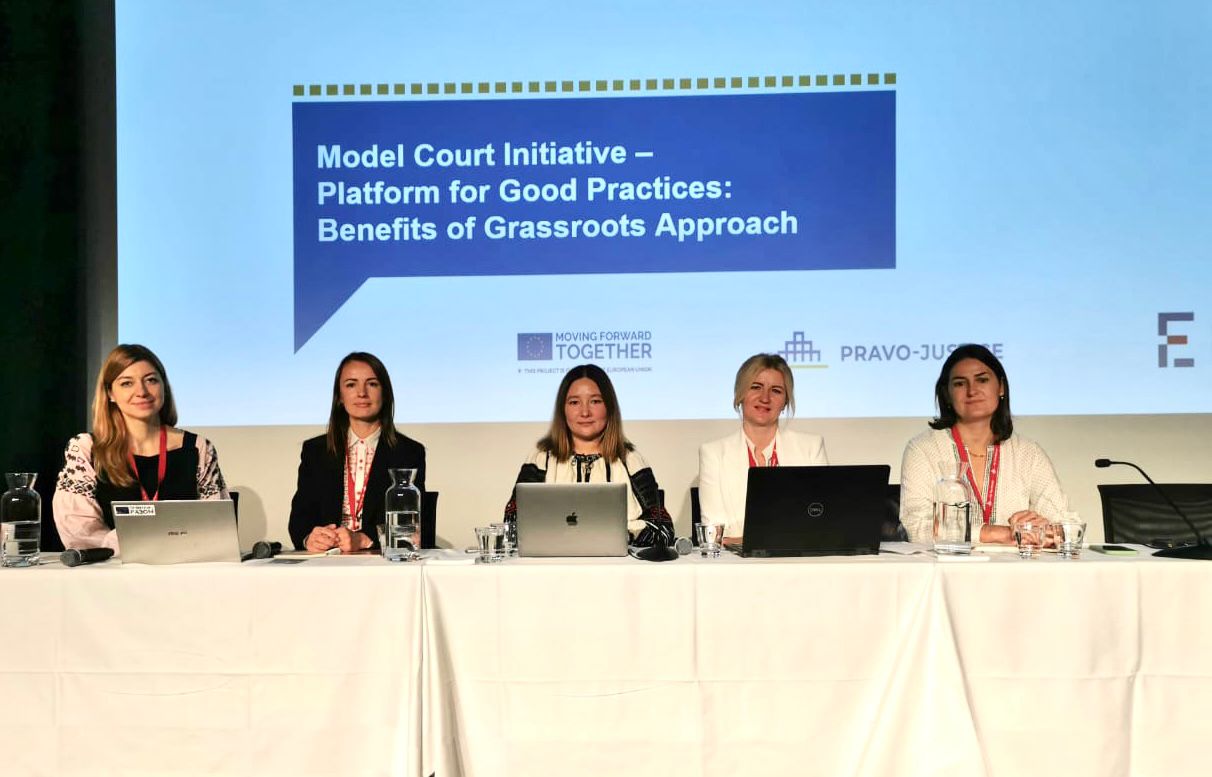EU Project Pravo-Justice experts presented achievements of Model Courts Initiative in Helsinki

Experts of the EU Project Pravo-Justice spoke about the development and peculiarities of the Model Courts Initiative during the conference "People-Centered Justice in the New Normal", organized on October 17-20 by the International Association for Court Administration in Helsinki, Finland.
Speaking at the conference, Key International Expert on Judicial Reform of the EU Project Pravo-Justice, Anna Adamska-Gallant, noted that the experts of the Project launched the Model Courts Initiative in response to the need of changing the approaches of judicial administration in Ukraine. After all, a greater focus on services for court users should have become a key factor in the modern approach to the administration of justice.
"The Model Courts Initiative is implemented using a "bottom-up" approach, helping to change the mindset of judges and court employees at the first level, subsequently influencing the formation of state policy (for example, the Council of Judges of Ukraine approved and recommended applying the Initiative's decisions in courts throughout Ukraine). From the very beginning, the Initiative was based on three pillars, such as customer service, court security, courtroom and court office activities. All recommendations regarding these areas are described in the "Model Court" Handbook, which was prepared by international and national experts of the Project, representatives of the civil society, as well as stakeholders of the judicial system of Ukraine," – said Anna Adamska-Gallant.
Key International Expert on Judicial Reform emphasized that the Initiative helps to solve a number of problems that arise during the daily functioning of courts and negatively affect the attitude of citizens to the judicial system. In particular, this is the lack of a unified approach to the organization of an integrated court desk, convenient signage, information about the schedule of court sessions, infrastructure for people with disabilities, policies for working with court personnel, etc.
“Due to the full-scale Russian aggression in February 2022, the Ukrainian judicial system faced unprecedented new challenges related to security, financing of the judicial system, access to justice and meeting the needs of vulnerable court users, whose number has increased significantly. Therefore, the decisions of the Initiative and the use of the "bottom-up" approach during their implementation are already showing their effectiveness even in the conditions of martial law," – Anna Adamska-Gallant emphasized.
In her turn, Polina Li, Key National Expert on Judicial Reform of the EU Project Pravo-Justice, spoke about the successful expansion of the network of model courts from 6 to 76 in recent years.
"It is important to note that courts often implemented model solutions independently, at the initiative of court management", – said Polina Li.
Key National Expert emphasized that thanks to the dissemination of model solutions through online and offline conferences, round tables, trainings and mentoring, it was possible to attract more than 4,000 participants – representatives of the judicial system, who implemented more than 100 model solutions in courts of all regions of Ukraine.
"Moreover, Ukrainian courts already have a number of their own best practices, which they actively share with their colleagues. Therefore, the next stage of the Initiative will be the creation of a public web platform "Model Courts: Platform of Good Practices".
Nataliia Tsap, National Expert of the Project, coordinator of the Model Courts Initiative, noted that the platform will help gathering all the achievements of the Initiative, as well as international projects aimed at improving the court's customer orientation, will become an informational and educational resource for all courts, will provide an opportunity for courts to share best practices of court administration.
"The platform will also contribute to the development of a community of courts interested in the effective development of court administration, the implementation of a client-oriented court, high-quality recovery after losses caused by war, the exchange of practical experience and new ideas," – emphasized Nataliia Tsap.
Yevhenia Bondarenko, National Expert of the Project, talked about such an important part of the Model Courts Initiative, as implementation of services for vulnerable court users. According to her, previously the Ukrainian judicial system did not sufficiently respond to the needs of vulnerable court users due to the lack of a systematic approach to solving this problem. As a result, there were obstacles in access to justice.
"In 2018, the EU Project Pravo-Justice started activities related to the creation of a system of support for vulnerable court users within the framework of the Model Courts Initiative. It included training, development of an interactive guideline for trainers on creating services, dissemination of best practices, development of a professional community, strengthening of inter-institutional cooperation, information campaigns, mentoring. As a result, we already have more than 50 successfully implemented projects in different parts of Ukraine," – said Yevheniia Bondarenko.
The National Expert also spoke about the piloting of volunteer services in courts, which has already been joined by 15 courts and over 300 volunteers from all over Ukraine.
"Volunteers help ensure proper access to justice for all groups, as well as make their visit to the court comfortable and efficient. That is why the possibility of introducing volunteer services in courts was reflected in the Strategy for the Development of the Justice System and Constitutional Justice for 2021-2023, approved by the President Decree. This is another successful case, when the "bottom-up" approach influenced the development of state policy in the field of justice", – Yevheniia Bondarenko emphasized.